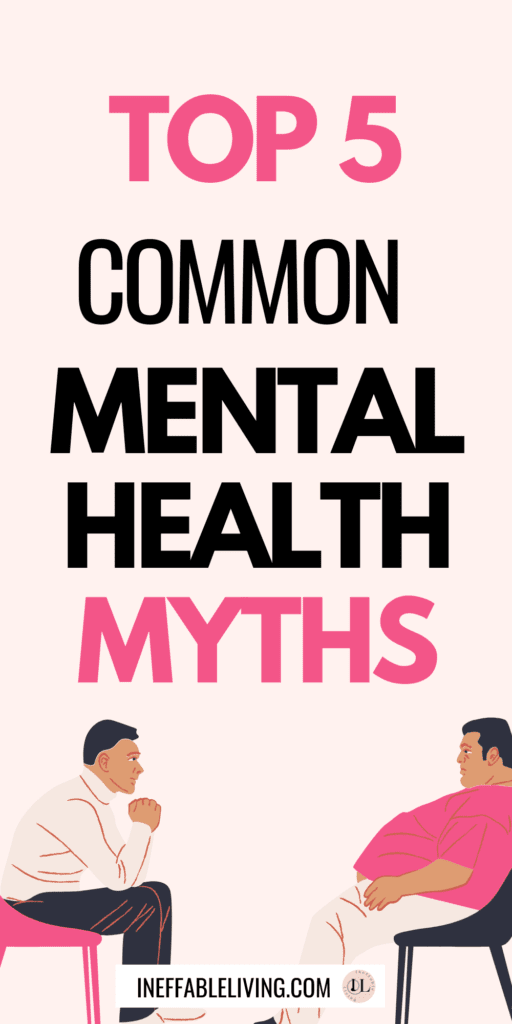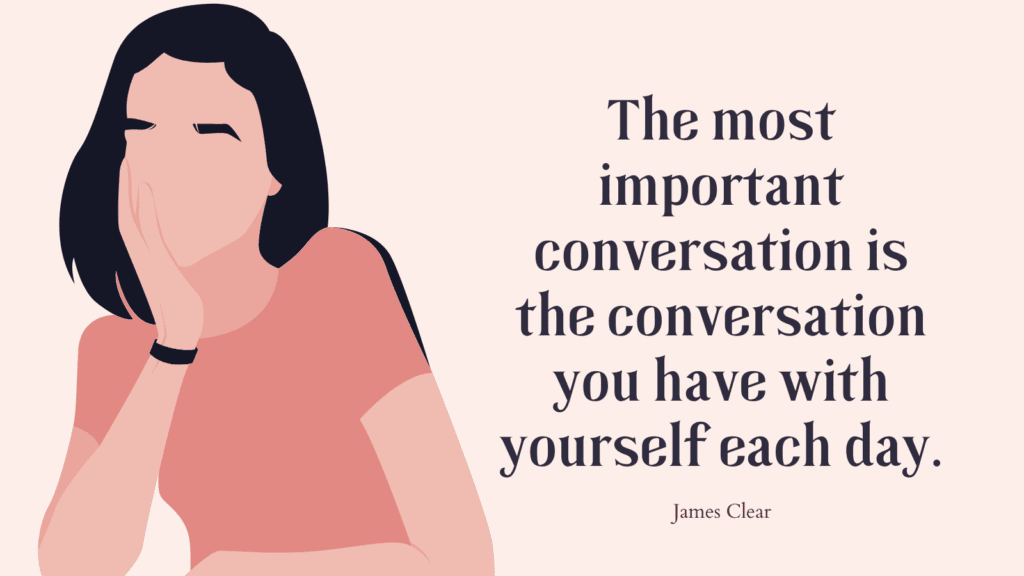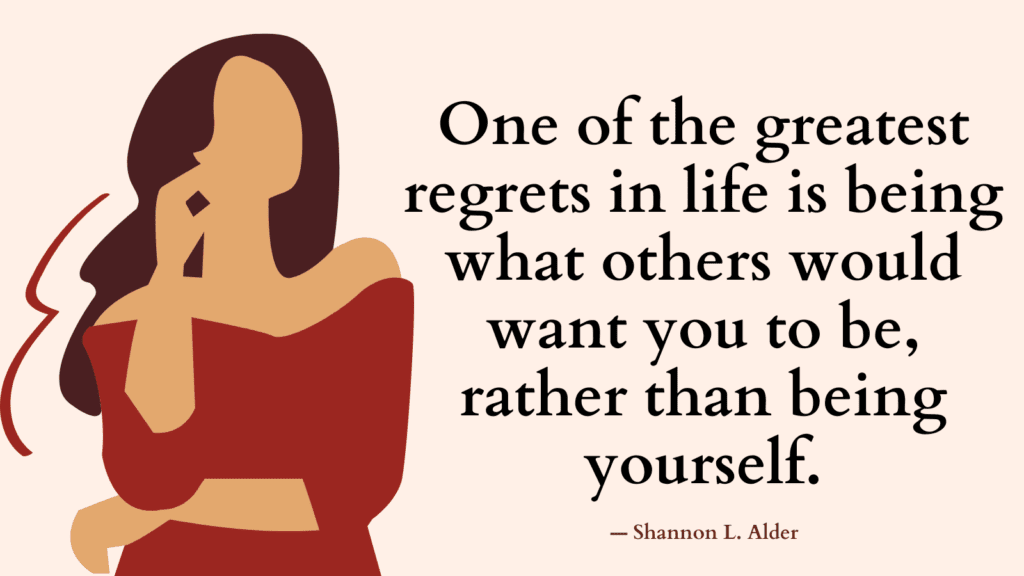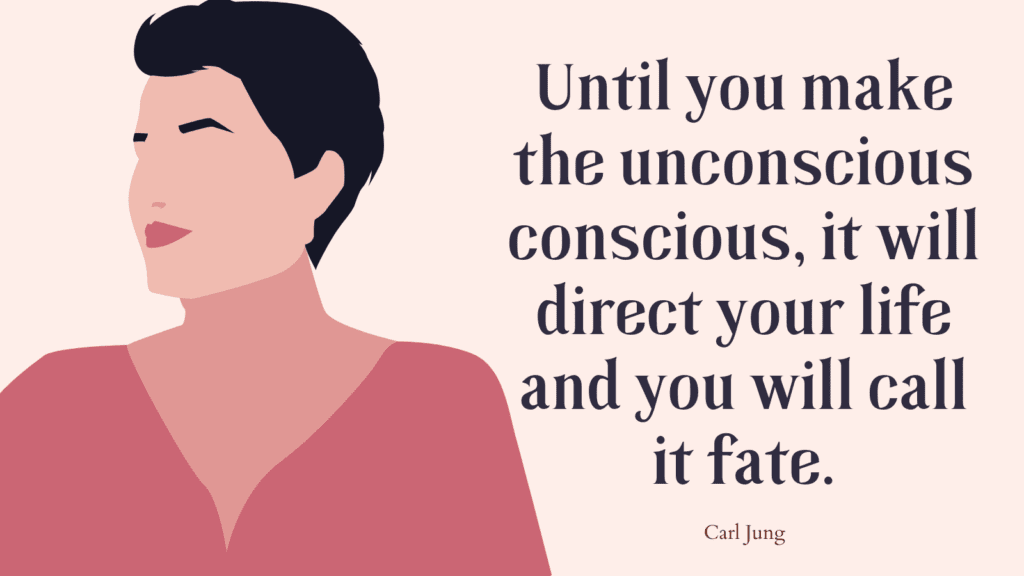Since 1949, May has been designated Mental Health Awareness Month in the U.S.
Observing mental health awareness month is a great way to reduce stigma surrounding mental illness and promote wellbeing.
This post contains practical ways to celebrate mental health awareness month and 5 top mental health myths and misconceptions.
How To Celebrate Mental Health Awareness Month?
1. Start a Conversation
We often find it hard to reach out for support even to those closest to us.
Start a conversation today by asking a loved one how they are doing and let them know that you’re there for them if they want to talk about anything bothering them.
You are not their therapist and you don’t need to offer advice or fix them. Just listening and validating their experience may be all they need to feel supported.
2. Reflect on Your Mental Health
Mental Health Awareness Month is a great opportunity to evaluate your psychological wellbeing.
Reflect on how you have been feeling for the past couple of months and if you’re not doing okay, consider reaching out for help.
Also, reflect on your habits and lifestyle. What can you change today to support your mental health?
The following are some ideas to consider:
- Get enough sleep every nigh
- Exercise regularly
- Eat healthy diet
- Practice mindfulness
- Keep a journal
- Do activities that you enjoy
- Practice gratitude
- Let go of toxic relationships
3. Donate In Support of Mental Health Causes
Consider donating to a mental health organization.
The following is a list of mental health charities that are actually making a difference:
- National Alliance on Mental Illness (NAMI)
- Mental Health America (MHA)
- The Jed Foundation
- American Foundation for Suicide Prevention (AFSP)
- Project Sanctuary
- Active Minds
- Battlefield Addiction
- The Trevor Project
- Trans Lifeline
You can also look up local organizations or domestic violence shelters that you could donate your resources and time to.
If you like listening to people, you can also consider becoming a listener online. 7 cups is a website that provides free support to people experiencing emotional distress by connecting them with trained listeners.
4. Share Mental Health Information
This is a great way to spread mental health awareness.
You could find out if a local organization needs help spreading awareness or even share links and posts on social media.
Even educating yourself may help you support other people.
5. Get Certified In Mental Health First Aid
Mental Health First Aid offers in-person courses around the country.
In this course you will learn how to help someone experiencing a mental health crisis by identifying and responding to signs of mental health conditions.
6. Listen to Mental Health Podcasts
Podcasts don’t replace therapy or counseling, but they can still help you feel seen and understood.
The following are some of the best mental health podcasts:
- Unlocking Us With Brené Brown: Spotify • Website
- On Our Minds: Apple Podcasts • Spotify • Website
- Therapy for Black Girls: Apple Podcasts • Spotify • Website
- Mental Illness Happy Hour: Apple Podcasts • Spotify • Website
- The Happiness Lab: Apple Podcasts • Spotify • Website
- Terrible, Thanks For Asking: Apple Podcasts • Spotify • Website
- Where Should We Begin? with Esther Perel: Apple Podcasts • Spotify • Website
- Ten Percent Happier With Dan Harris: Apple Podcasts • Spotify • Website
7. Create Self-Care Ritual
Create proactive self-care practices depending on your needs.
They don’t have to be hours long, even a few minutes of deep breathing or 15-minute meditation can be all you need to recharge.
Apps like Headspace, Calm, and Breethe make self-care activities like mediation and deep breathing easy and accessible.

Common Mental Health Myths and Misconceptions
Currently, the field of psychology has advanced in precise diagnosis (i.e. determining what is wrong) and treatments based on scientific research.
However, mental health disorders still hold a negative connotation because they often come across as confusing and frightening.
Misconception 1: Substance Abuse, Anxiety, And Depression Are Not “Mental Illnesses”
Many people don’t want to be called ‘mentally ill’. Some people choose the labels ‘abnormality’, ‘condition’ and ‘syndrome.’
Other people prefer ‘disorder’. But according to psychiatrists, ‘disorder’ and ‘illness’ mean the same thing.
The UK government says that one in four of its citizens will develop a ‘mental illness’ during their lifetime. These figures include the big three – substance abuse, anxiety and depression.
Some people choose to distinguish mental illness from severe mental illness, with the latter group made up of people who lose touch with reality.
Misconception 2: It Is Not Possible To Have A Little Bit Of Mental Illness – You Either Have It Or You Don’t
Officially, a condition, such as OCD, depression, bipolar, etc. is either present or it’s not. It is no more possible to be a little bit depressed than it is to be a little bit pregnant or a little bit dead.
You are either depressed or you are not.
There are some valid reasons for this distinction. In order to monitor illnesses and decide who is eligible for treatment, professionals have to set certain requirements.
But in the real world, things aren’t that simple.
Subclinical disorders are everywhere.
A person who’s struggling with depression or anxiety, might not satisfy the characteristics, and might not recognize that they have a mental health problem. This can mean the issue won’t get talked about, and support and treatment won’t be sought. Things can go from bad to worse.
Just as autism is now considered a spectrum of related syndromes, so other disorders can sit on their own spectrum, and require as much attention as an official diagnosis.
The conceptual shift to view certain disorders as a spectrum of related conditions rather than an isolated problem can help understand those affected better, and can help them to understand themselves.
Misconception 3: Mental Illness Is The Result of Poor Parenting
When there is an illness, the first question the attending doctor is asked is typically either how did this happen or what caused this.
Knowing the underlying cause somehow seems to make things more tolerable.
When parents learn that their child has a mental illness, the first question that comes up to their mind is, “What did we do wrong? Where did we screw up? We tried to be the best parents we could be, and yet it was not good enough.”
But mental dis-order can grow from order.
The fact that someone struggles with anxiety doesn’t imply fault more than struggling with diabetes doesn’t.
While it’s true that many mental disorders can develop from childhood maltreatment or abuse, one does not cause the other in all cases.
Someone who grew up in a healthy family and who was properly nurtured might struggle with Generalized Anxiety Disorder or depression just like a child who grew up in an abusive environment.
Related: How To Prevent Narcissism In A Child? 7 Ways to Make Sure You Are Not Raising a Narcissist
Misconception 4: Mental Illness Leads to Violence
Sometimes, we use certain terms that ascribe negative traits to people we don’t really know, such as that woman is a weirdo, he is creepy, etc, especially when it comes to those with mental illness.
A study from 2012 conducted by Parker Magin and colleagues showed that almost 30 percent of people in a medical waiting room said that they would be uncomfortable sharing it with someone who has schizophrenia.
12 percent said they would be uncomfortable sharing with someone diagnosed with depression.
Some argue that the stigmatization of mental illness can be considered a ‘second disease’ for the mentally unwell, given the way others treat them.
This leads to increased anxiety, stress, and lower quality of life.
But is this warranted? Do people with mental illness constitute a real threat?
An in-depth study, funded partly by the US National Research Council, by Mark Moore and colleagues, showed that in the case of lethal school violence, ‘serious mental health problems, including schizophrenia, clinical depression, and personality disorders, surfaced after the shootings’ for most of the shooters.
In other words, mental illness in itself does not seem to be the cause of lashing out. Instead, it is part of a complex array of problems that include isolation, lack of parental support, bullying, substance abuse, and easy access to guns.
Another study of offenders with mental illnesses by Jillian Peterson and colleagues from 2014, revealed that of the 429 crimes they coded, 4 percent related directly to a psychosis (including symptoms of schizophrenia), 3 percent related to depression, and 10 percent related to bipolar disorder.
The authors of the study concluded, ‘Psychiatric symptoms relate weakly to criminal behavior.’
In fact, it is often the same kinds of circumstances that lead to violence in general that also lead to violence for the mentally ill.
So where does the connection between crime and mental illness come from?
One factor seems to be substance abuse.
People with mental illness, such as schizophrenia or depression are more likely than the average person to take drugs or engage in problematic drinking, in an attempt to escape the awful symptoms they are experiencing.
A study from 2015 by Ragnar Nesvåg and colleagues revealed that the rate of diagnosed substance-use disorders was at 25.1 percent for schizophrenia, 20.1 percent for bipolar disorder and 10.9 percent for depression.
In this sense, mental illness can be a risk factor for substance abuse, which in turn is a risk factor for violence.
It seems that substance abuse is the link here, not the mental illness per se. Mental illness alone is not an indicator of violent tendencies.
This means that the emotional and physical distance we keep from people with mental illness is unfounded but also devastating for those affected.
Related: How To Manage Your Anger In Healthy, Effective Ways?
Misconception 5: Black People Don’t Suffer From Mental Illnesses
A study conducted in the early ’90s, church pastors, asked about their opinions regarding Black suicide, responded by saying that suicide was a “denial of Black identity and culture.”
The overarching message from the pastors was that suicide is “a white thing” and that Black people are resilient.
This assumption about suicide was embraced throughout the Black community, according to the same study.
However, studies indicate that the suicide rate among Black adolescents has increased by 73 percent while for young Black males, injury from suicide attempt rose by 122 percent — indicating they are using more lethal means according to the executive summary of a report by the Congressional Black Caucus, “Ring the Alarm: The Crisis of Black Youth Suicide in America”.
This, in itself, implies an epidemic in Black mental health.
Often, the psychological distress goes unchecked. Despite being in pain, many black people don’t recognize their pain as a crisis and don’t reach out for help. They assume that they are supposed to have the strength to handle whatever life throws at them.
Recognizing the dire state of Black mental health requires changing the idea of what it means to be emotionally healthy.
Just because you were able to get the boys fed and off to school and get yourself to work, does not mean that all is well and that you can’t accomplish your daily tasks while feeling so sad and empty.
Mental Health FAQs
HOW DO I FIND A THERAPIST?
The relationship between a therapist and a client is a unique one. Finding the right therapist for you might take multiple tries. But ultimately, the search will be worth it.
Go directly through your insurance. Many insurance plans offer helplines you can call or databases where you can search by location, specialty, and even method of therapy.
Search online. Psychology Today therapist finder offers extensive filtering options that can facilitate your search.
Referrals work, too. You might ask your general practitioner for recommendations. You can also ask friends if they like their therapists and would recommend them to you.
Find someone you feel comfortable with, someone who is familiar with (or even specializes in) issues that are important to you.

Resources
- Portions of this article were adapted from the book Evil: The Science Behind Humanity’s Dark Side, © 2018 by Julia Shaw. All rights reserved.
- Portions of this article were adapted from the book Life Is Trichy, © 2014 by Lindsey Muller. All rights reserved.
- Portions of this article were adapted from the book The Unapologetic Guide to Black Mental Health, © 2020 by Rheeda Walker. All rights reserved.
- Portions of this article were adapted from the book The Man Who Couldn’t Stop, © 2014 by David Adam. All rights reserved.
- Portions of this article were adapted from the book Healing Depression Without Medication, © 2020 by Jodie Skillicorn. All rights reserved.
- Mental Health Month | NAMI: National Alliance on Mental Illness
- Mental Health Month | Mental Health America (mhanational.org)
- Mental Health Myths and Facts | MentalHealth.gov
- 11 myths about mental health (medicalnewstoday.com)
- Busted: 7 myths about mental health | UNICEF Parenting
- Myths and facts | SA Health
- Mental Health Myths: Stop the Stigma – familydoctor.org
- Myths About Mental Illness – CMHA National




Comments are closed.